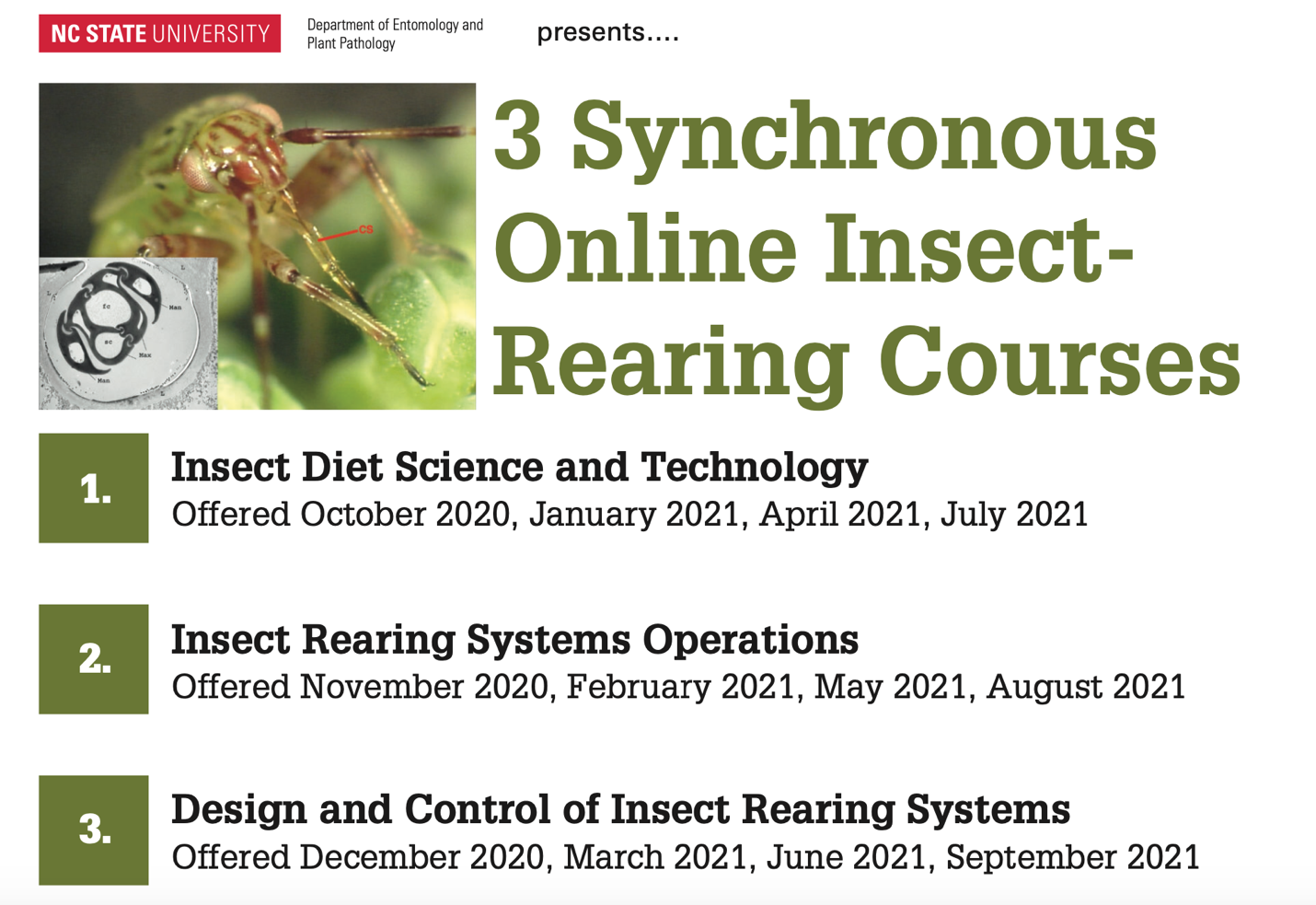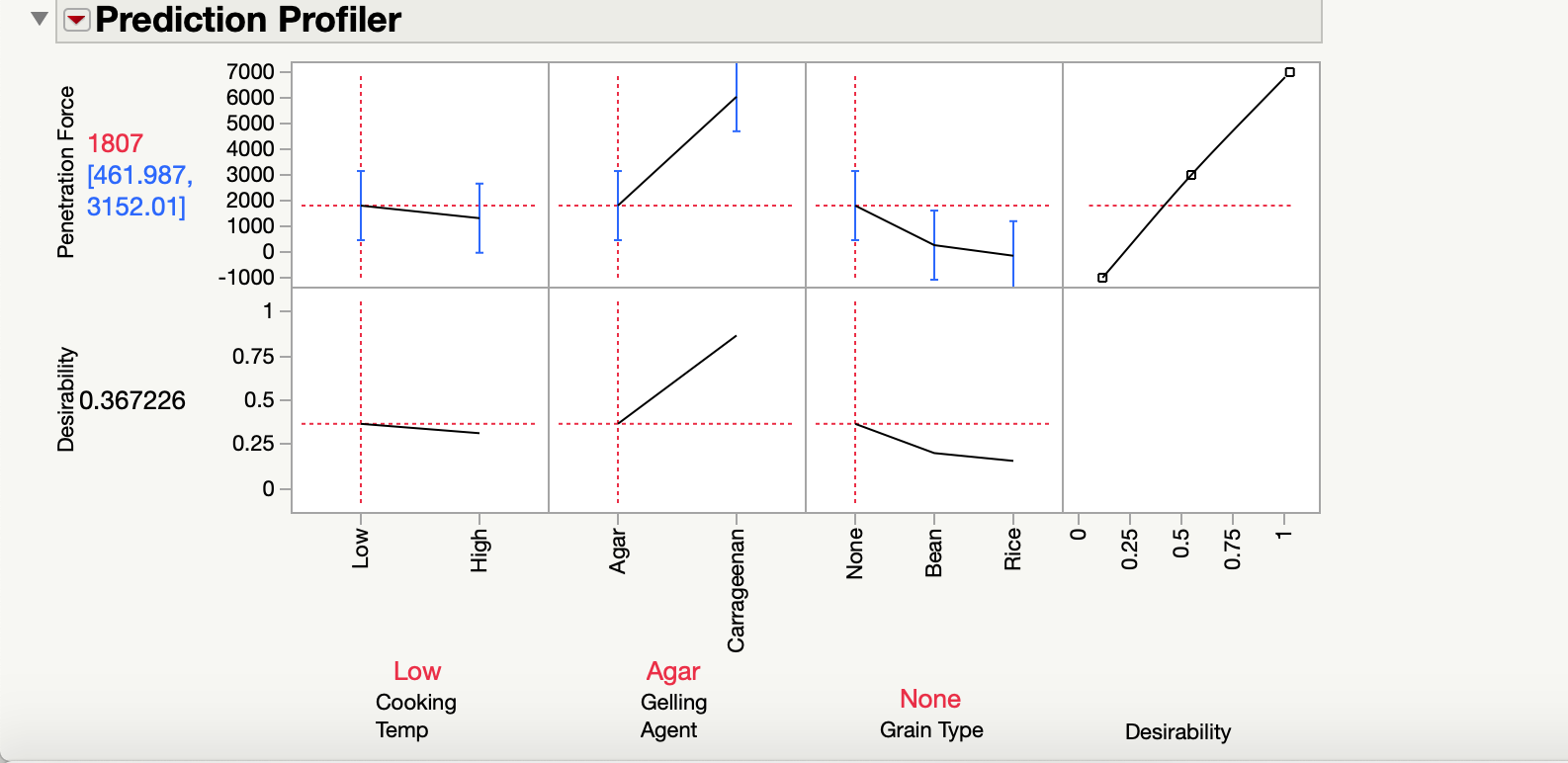New Rearing Course to Be Offered Online: Fundamentals of Insect Rearing Systems.
Our newest course for entry- and mid-level insectary workers and rearing specialists.
Taught from October 3 through November 9, Tuesdays and Thursdays from 1100 am to 100 pm Eastern Time. The course consists of 24 hours of instruction from Professor Allen Carson Cohen. More details in the blog post and to follow.

What’s New in Rearing Education at IREaR (Insect Rearing Education and Research)?
Last week (July 27-29, 2021), we finished the 5th set of synchronous (live), online insect rearing courses. I (Allen Cohen) consider the courses a success in several ways: 1) we provided detailed instruction to more than 40 students (participants who ranged from entry-level insectary employees to post-doctoral associates and professional entomologists). 2) We delivered more than 60 hours of instruction to these people in live classes with considerable interaction, especially with discussions that extended after the classes ended (with each participant being free to leave the discussion). This setup allowed in-depth instruction and probing various rearing topics (anti-microbial agents, gelling agents, pathogens/contaminants, environmental factors, genetics/epigenetics, etc.) 3) Participants were provided, as part of the course content, materials delivered through the Moodle system where PDFs, course notes, and other instructional materials were available. 4) This instructional format (live, online) allowed Professor Cohen to go into details on issues of special interest to participants, often with follow-ups based on research done by Cohen on an “on the spot” basis. For example, when we discussed the issue of water activity in one of the classes (on Tuesday), Cohen was able to go in the lab and conduct some water activity experiments whose results he was able to provide by the next class on Thursday! In other cases, where questions arose (such as “can we ‘cure’ bacterial infections in our insects?”), Professor Cohen was able to consult the literature and have a rather complete answer at the following class meeting. All of this ‘immediacy’ was further enhanced by extensive use of videos presented in an MP4 format. With each successive class, the instructor was able to improve the immediacy and effectiveness of the Zoom system. In the most recent classes, Cohen was able to conduct LIVE tutorials of using the JMP (SAS) system to interpret and present information on statistically-based process control, design of experiments, and quality control.
Cohen describes the courses, presented in a live Zoom format as having the immediacy of LIVE presentation and the opportunity for students to be involved in the presentation of rearing concepts. He comments further that the 3 courses are designed to cover all aspects of rearing as a scientific enterprise. The courses approach rearing from a design of experiments approach to ALL rearing issues. For example, in yesterday’s class, Cohen discussed the effects of heat processing and addition of beans vs. rice and agar vs. carrageenan on gel strength (texture) of insect diets. This illustration was a topic of yesterday’s discussion.

Using these and related diagrams, Cohen explained the implications of several factors on the quality and efficacy of insect diets.
ONLINE LIVE Courses in Insect Rearing (from The North Carolina State University’s Office of Professional Development)
Format of Courses: 20 hours of instruction (5 hours per week for 4 weeks) of lecture and discussion
Not-for-Credit Classes with Ample Interaction between Participants and Instructor
Taught in Zoom (with Moodle) on a synchronous (live) basis where PowerPoint presentations and videos are presented and discussed.
Late afternoon (Tuesday and Thursdays) in Eastern Time Zone: Note: other times can be arranged provided that 5 or more students are enrolled.
Cost of Registration: $250/Participant for each 20-hour class times three courses ($750 for all 3 courses)
Course Contents based mainly on Allen Carson Cohen’s books, Insect Diets: Science and Technology and Design, Operation, and Control of Insect Rearing Systems (both from CRC Press) plus recent and current research in the Insect Rearing Education and Research Program at North Carolina State University
Currently 3 different courses will be offered: I) Diet Science and Technology; 2) Rearing Systems Operations; 3) Design and Control of Insect Rearing Systems (based on SAS, JMP system)
Course Materials: PDFs of Course Materials Including Lecture Notes. Recommended Supplementary Reading: Cohen, A. C. 2015 Insect Diets: Science and Technology. 2nd Edition. CRC Press. Boca Raton, FL.
Cohen, A. C. In Press. Design, Operations, and Control of Insect Rearing Systems. CRC Press. Boca Raton, FL.
Course I: Diet Science and Technology (October 2021-December 2021)*
|
Course Overview and Objectives/Types of Insect Diets |
Tues. Oct. 5 Classes start at 2:00-4:30 pm EST |
|
Feeding Biology: Lecture & Discussion/Videos |
Thurs Oct. 7 |
|
Feeding Biology: Lecture & Videos |
Tues. Oct. 12 |
|
Feeding Biology: Nutrition & Diet Presentation |
Thurs. Oct. 14 |
|
Characteristics of Successful Diets |
Tues. Oct. 19 |
|
Diet-making Equipment & Procedures |
Thurs. Oct. 21 |
|
Diet and Diet Component Preservation |
Tues. Oct. 26 |
|
Development and Improvement of Diets |
Thurs. Oct. 28 |
Course II: Rearing Systems Operations
|
Introduction/Historical Basis of Modern/Current Rearing Systems |
Tues. Nov 2 Classes start at 2:00-4:30 EST |
|
Equipment in Rearing System 1: Physical Principles |
Thurs. Nov 4 |
|
Equipment in Rearing Systems 2: Kinds of Equipment |
Tues. Nov 9 |
|
Rearing Systems as Artificial Ecological Niches |
Thurs. Nov. 11 (Possible alternative day) |
|
Interactions of Rearing System Components |
Tues. Nov. 16 |
|
Issues of Management, Containment, and Safety in Rearing Systems |
Thurs. Nov 18 |
|
Survey and Summary of Rearing Systems: Lepidoptera, Diptera |
Tues. Nov 23 |
|
Survey and Summary of Rearing Systems: Coleoptera, Hemiptera, “Minor Systems” |
Tues. Nov 30 (Note: we skipped Nov. 25 for Thanksgiving holiday) |
Course III: Design and Control of Insect Rearing Systems
|
Reducing Error, Variability, & Uncertainty in Your Rearing System; STRESS in Rearing Systems |
Thurs. Dec. 2. Classes start at 2:00-4:30 EST |
|
Optimizing Rearing System Components: Part I |
Tues Dec. 7 |
|
Optimizing Rearing System Components: Part II |
Thurs Dec. 9 |
|
Process Control in Your Rearing System: Part I |
Tues Dec. 17 |
|
Process Control in Your Rearing System: Part II |
Thurs Dec 16 |
|
Design of Experiments: Practical Applications in Rearing Systems |
Tues Dec 21 |
|
Developing and Using Control Charts |
Thurs Dec 23 |
|
Quality Control, Stress, and Fitness |
Tues Dec 28 |
*Special Notes: 1. All courses deal with and are based on these topics and tenets: a) stress, fitness, and quality in rearing systems; b) interactions of rearing system components; c) design of experiments (DoE) is the fundamental approach to rearing system development and optimization; d) rearing is most productive if treated as a science; e) rearing systems are artificial ecological niches; f) knowing the biology of the insects and the chemistry and physics of rearing systems leads to best practices; g) rearing systems should be approached with a continuous improvement model; h) rearing systems are designed (engineered) to meet our needs and purposes, therefore: i) insects derived from rearing systems are domesticated.
As rearing system professionals, we try to the best of our abilities to juggle these complex issues to produce the highest quality insects that can meet our purposes (research, biological control, SIT, as food for other organisms, for commodity production, for conservation, for medical purposes, etc.)
Course Registration
Insect Rearing Systems Operations
